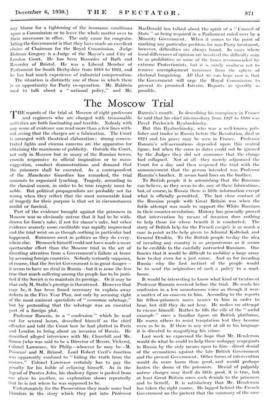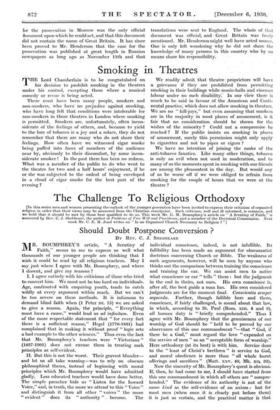The Mosc ow Trial
THE reports of the trial at Moscow of eight professors
1 and engineers who are charged with treasonable activities are both fascinating and terrible. Nobody with any sense of evidence can read more than a few lines with- out seeing that the charges are a fabrication. The Court is arranged with theatrical elaboration ; strong concen- trated, lights and cinema cameras are the apparatus for obtaining the maximum of publicity. Outside the Court, not only in Moscow but in many of the Russian towns, crowds responsive to official inspiration or to mass- suggestion, conduct demonstrations and demand that the prisoners shall be executed. Asa correspondent of the Manchester Guardian has remarked, the trial amounts to organized lynching. Tragedy, according to the classical canon, in order to be true tragedy must be noble. But political propagandists are probably not far wrong when they reflect that the most memorable kind of tragedy for their purpose is that set in circumstances sordid or farcical.
Part of the evidence brought against the prisoners in Moscow was so obviously untrue that it had to be with- drawn for form's sake, if not for shame's sake, but other evidence scarcely more creditable was rapidly improvised and the trial went on as though nothing in particular had happened. Extremes meet in politics as they do every- where else. Bismarck himself could not have made a more spectacular effort than the Moscow trial in the art of diverting attention from a Government's failure at home by accusing foreign countries. Nobody seriously supposes, of course, that the Soviet Government is in great danger— it seems to have no rival in Russia—but it is none the less true that much suffering among the people has to be justi- fied if the Soviet is to maintain its prestige. Or it may be that only M. Stalin's prestige is threatened. However that may be, it has been found necessary to explain away defects in the Five Year Plan, not only by accusing, eight of the most eminent specialists of " economic sabotage," but by pretending that the sabotage was an essential part of a foreign plot.
Professor Ramzin, in a " confession " which he read nut for several ' hours, described himself as the chief offender and told the Court how he had plotted in Paris and London to bring about an invasion of Russia. He described alleged interviews with Mr. Churchill and Mr. Simon (who was said to be a Director of Messrs. Vickers), Colonel Lawrence, Sir Philip—whoever he may be—M. Poineare and M. Briand. Lord Robert Cecil's function was apparently confined to " hiding the truth from the masses." Colonel Lawrence certainly has to pay the penalty for his foible of eclipsing himself. As in the legend of Prester John, his shadowy figure is pushed from one place to another, as exploration shows repeatedly that he is not where he was supposed to be.
Unfortunately for the Prosecution they made some bad blunders in - the story which they put into Professor Ramzin's mouth. In describing his conspiracy in Friince he said that his chief intermediary from 1927 to 1930 was Pavel Pavlovich Ilyabushinsky.
But this Ryabushiusky, who WI'S a well-known pub- lisher and trader in Russia before the Revolution, died in 1924 and his grave may be seen in France. Professor Ramzin's self-accusations depended upon this central figure, but when the error in dates could not be ignored by the Judges they did not announce that the charge had collapsed. Not at all—they merely adjourned the Court for a day and then reopened the trial with the announcement that the person intended was Professor Ramzin's brother. It seems hard lines on the brother.
To British people it is astonishing that the Russians can believe, as they seem to do, any of these fabrications, but, of course, in Russia there is little information except what is officially permitted. The last close contact of the Russian people with Great Britain was when the futile attempt was made to support the White Russians in their counter-revolution. History has generally proved that intervention by means of invasion does nothing to help those for whose benefit it is conducted. The story of British help for the French emigres is as much a case in point as the help given to Admiral Koltellak and General Denikin. To the British people to-day the idea of invading any country is as preposterous as it seems to be credible to the carefully instructed Russians. One fancies that it would be difficult to mobilize a large army here to-day even for a just cause. And as for invading Russia—why the first instinct of the people would be to send the originators of such a policy to a mad- house.
It would be interesting to know what kind of treatment Professor Ramzin received before the trial. He reads his confession in a low monotonous voice as though it were a matter of no concern to him. According to the reports his fellow-prisoners move nearer to him in order to hear, but still they do not hear. Ile makes no attempt to excuse himself. Rather he fills the role of the " awful example " once a familiar figure on British platforms. He warns others to resist temptation lest they become even as S he is. If there is any zest at all in his language it is directed to magnifying his crime.
Last week we expressed the hope that Mr. Henderson would do what he could to help these unhappy scapegoats in Russia by the only means open to him—direct denial of the accusations agaihst the late British Government and the present Government. Other forms of intervention would do more harm than good, and would perhaps hasten the doom of the prisoners. Denial of palpably untrue charges may itself do little good, it is true, but at least Great Britain owes such denials to the prisoners and to herself. It is satisfactory that Mr. Henderson has taken the right .course. He lagged behind the French Government on the pretext that the -summary of the case
Tor the prosecution in Moscow was the only official document upon which he could act, and that this document did not contain the name of Great Britain. It has since been proved to Mr.' Henderson that the case for the prosecution was published at great length in Russian newspapers as long ago as November 11th and that translations were sent to England. The whole of that document was official, and Great ' Britain was freely mentioned. Mr. Henderson might well have acted sooner. One is only left wondering why he did not share the knowledge of many persons in this country who by no means share his responsibility.



























































 Previous page
Previous page